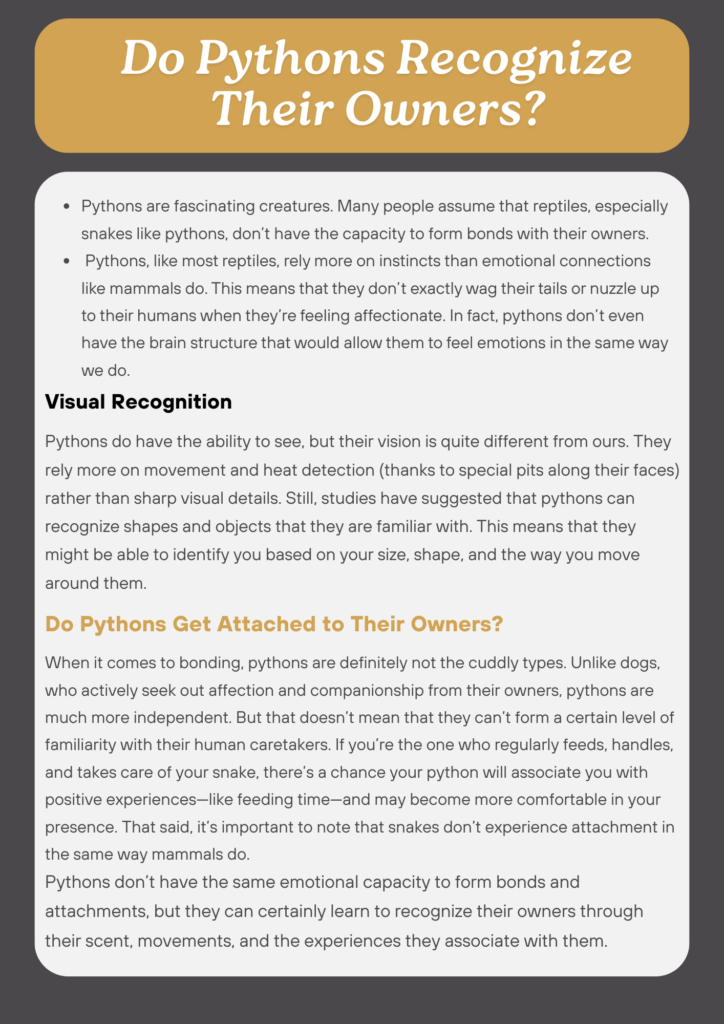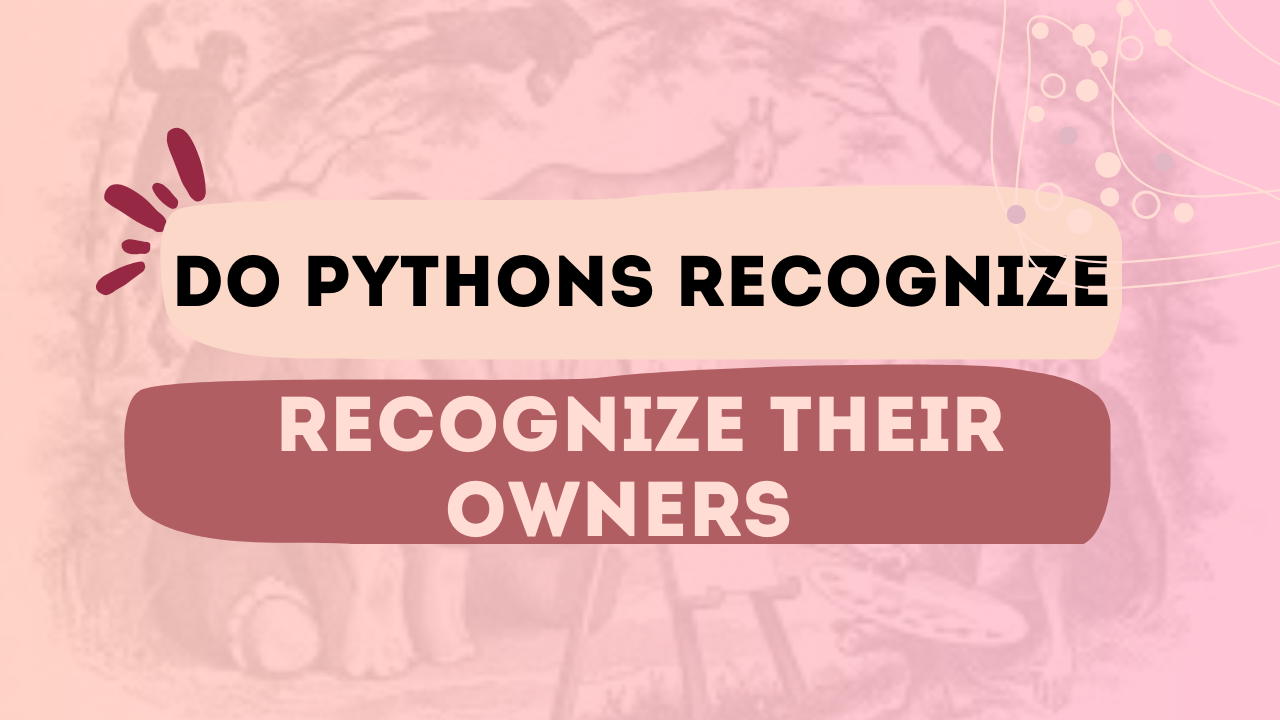Have you ever wondered, Do pythons recognize their owners. Well, the answer isn’t as simple as a yes or no, but let’s dive into it and explore the fascinating behaviors of these slithering reptiles and what we actually know about their ability to recognize humans. If you’re a proud python owner or simply curious about how these creatures behave, you’re in for a treat!
Pythons are fascinating creatures. Many people assume that reptiles, especially snakes like pythons, don’t have the capacity to form bonds with their owners. After all, they’re not exactly known for being the most affectionate pets, right?
Understanding the Basics of Python Behavior
Before we get into the whole “recognizing their owners” thing, let’s break down the basics of a python’s behavior. Pythons, like most reptiles, rely more on instincts than emotional connections like mammals do. This means that they don’t exactly wag their tails or nuzzle up to their humans when they’re feeling affectionate. In fact, pythons don’t even have the brain structure that would allow them to feel emotions in the same way we do. But don’t let that fool you—this doesn’t mean pythons are entirely incapable of recognizing their owners.
Unlike dogs or cats, who have been domesticated over thousands of years to be social animals, pythons are wild animals with more primal instincts. That being said, they do have sharp senses, particularly when it comes to smell and sight. So, while you might not get a cuddle session from your python, it’s not entirely out of the realm of possibility that they can, in their own way, “recognize” their humans. Let’s explore how they might do this.
The Role of Smell in Recognition
One of the most important senses for a python is its sense of smell, or more accurately, its ability to detect pheromones and chemical signals. Pythons, like other snakes, have a specialized organ called the Jacobsen’s organ, or the vomeronasal organ, which helps them interpret scent signals. This is a huge part of how they interact with the world around them. So, if you’re a python owner, there’s a good chance that your snake recognizes you through your unique scent.
When you handle your python regularly, your snake becomes accustomed to your scent. It’s possible that your python associates your particular smell with the comfort of being fed, handled, or simply being around. That said, this recognition may not be the same as “recognizing” you like a dog would—meaning that the python is not emotionally bonding with you, but rather associating you with certain experiences. So, yes, your python might know you by your scent, but it’s not like they’re jumping with joy when you enter the room.

Visual Recognition: Can Pythons See and Recognize Their Owners?
Pythons do have the ability to see, but their vision is quite different from ours. They rely more on movement and heat detection (thanks to special pits along their faces) rather than sharp visual details. Still, studies have suggested that pythons can recognize shapes and objects that they are familiar with. This means that they might be able to identify you based on your size, shape, and the way you move around them.
However, unlike a dog who might wag its tail when it sees its owner, pythons won’t display obvious signs of recognition through body language. Instead, you might notice that your python seems calm or less fearful when you handle it, which could indicate that it recognizes you as a non-threatening presence. It’s more of a learned recognition than an emotional one. In short, pythons can see you, but they may not necessarily “recognize” you the way we think about recognition in other animals.
Do Pythons Get Attached to Their Owners?
Okay, here’s where it gets interesting. Some snake owners claim that their pythons become more tolerant or even more comfortable around them the more they interact. This can be interpreted as the snake becoming “used to” the human’s presence, but whether that constitutes a real attachment is up for debate.
When it comes to bonding, pythons are definitely not the cuddly types. Unlike dogs, who actively seek out affection and companionship from their owners, pythons are much more independent. But that doesn’t mean that they can’t form a certain level of familiarity with their human caretakers. If you’re the one who regularly feeds, handles, and takes care of your snake, there’s a chance your python will associate you with positive experiences—like feeding time—and may become more comfortable in your presence. That said, it’s important to note that snakes don’t experience attachment in the same way mammals do.
Handling and Bonding With Your Python
When you handle your python regularly, you’re giving it an opportunity to become familiar with you. This can result in less stress for the snake, as it becomes accustomed to human touch and interaction. In some cases, pythons may even start to recognize their owners as a source of food, which is a big deal for any snake! If your snake starts to calm down when it sees you and doesn’t react as aggressively, it’s possible that it is learning to feel more comfortable with you.
It’s also worth noting that some pythons will “forgive” their owners if they make a mistake while handling them. If a snake is handled too roughly or in a way that stresses them out, it might initially recoil or act defensively. However, if the handling is gentle and consistent, pythons may become more accustomed to their owners and show less of a fear response.
Conclusion: Do Pythons Really Recognize Their Owners?
So, do pythons recognize their owners? Well, the short answer is: yes, but not in the same way that dogs or cats do. Pythons don’t have the same emotional capacity to form bonds and attachments, but they can certainly learn to recognize their owners through their scent, movements, and the experiences they associate with them.
While you won’t be getting any affectionate hugs or tail wags from your snake, there is definitely a level of recognition that comes with consistent interaction. As a python owner, you’ll likely see that your snake becomes more comfortable and less fearful of you over time, which is a form of recognition in its own right. But remember, pythons are wild animals with instincts that drive their behavior, so any signs of recognition are more about familiarity and comfort than emotional attachment.
In the end, pythons may not be the affectionate pets we often imagine, but they can still be fascinating companions that grow accustomed to their owners’ presence in their own unique way.

